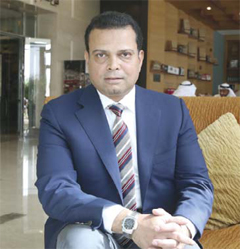 Information Technology, especially communication technology, is a key business driver. Among one of the fast growing markets in Kuwait, where companies, large corporations, ministries and government departments are seeking means of streamlining communication in house and with stake holders. Kuwait Times spoke with Mohammed Areff, Vice President Middle East, Africa and Turkey for Avaya to hear his views on upcoming trends in the complex world of IT and issues shaping communication technology and solutions for the future.
Information Technology, especially communication technology, is a key business driver. Among one of the fast growing markets in Kuwait, where companies, large corporations, ministries and government departments are seeking means of streamlining communication in house and with stake holders. Kuwait Times spoke with Mohammed Areff, Vice President Middle East, Africa and Turkey for Avaya to hear his views on upcoming trends in the complex world of IT and issues shaping communication technology and solutions for the future.
KT: Would you please brief us on Avaya's history/background?
Areff: Avaya Inc. is a company with a long history. It is an American multinational technology company headquartered in Santa Clara, California, In the Middle East, our headquarters are in Dubai. Avaya in Kuwait is working with our partner Medco. We provide business communication solutions for customer and team engagement.
Avaya enables business processes. So any organization, whether government, private sector or retail can benefit from our services. Avaya understands business process within an organization and can help an organization develop communication in such a way that the end user (customers) for a business, will be satisfied. We also want to provide meaningful conversations from which organizations can actually understand their customers better when they use our solutions.
In Kuwait, Avaya has a proven track record. We provide communication services, mobility solutions and infrastructure solutions for some of Kuwait's most trusted businesses and organizations including KOC, Kuwait Finance House, Al-Shaya and others.
KT: Explain Avaya's focus and services?
Areff: We focus on two areas: software and services. Communication is the foundation of IT today and we are the major player in communication. Needless to say, IT is needed by companies, governments and organizations. The IT department will tell the future of a company. Governments rely on IT solutions to be able to provide services to their citizens.
KT: Can you talk more about the trends and transformation in the Kuwait market in terms of IT?
Areff: The biggest trend right now is the 'Internet of things'. How can we enable the 'Internet of things' in the future? How can we build the infrastructure today? Organizations also want not only to satisfy customers, but also to build relationships. If you look at the present technology landscape, a lot of people say that investment has reduced. But in Kuwait, I think, it's different. The investments here are increasing, people now are using these as an opportunity to consolidate and solidify what they have today, as infrastructure for IT.
But they also want to go ahead and see how they can make a meaningful investment today that will impact their customer's directly. When it is not driven by revenue, or cost reduction concerns but simply generated by saying that I want to provide the best service to my customers. When my customers are delighted with me, eventually my business is going to sustain and grow.
KT: It seems most of your customers all major companies? Does Avaya provide solutions to small and medium enterprises?
Areff: Yes we do. Avaya has two portfolios: one for mid-market and the upscale market which includes governments. We believe that the economy of the country is driven by the small and medium enterprises, the big enterprises are there, but the small and medium companies nowadays are demanding solutions as well. With a solution that has the same flexibility, we targeted small and medium companies. We have a significant number of them in this country and they are using our solutions. We even provide to individuals living in a villa who need a data and Wi-Fi solution.
KT: So in a way, you are competing with the telcos?
Areff: No. We are complementing each other. Telcos provide infrastructure. We provide the end point in terms of the device or the application needed.
KT: Who are the big spenders in IT solutions in Kuwait?
Areff: In Kuwait, the number one spenders are banks. In addition to this are the government agencies or ministries in Kuwait like the Ministry of Finance, Ministry of Defense, and Ministry of Justice, among others. Just to clarify, the agencies are not actually spending, but they are investing their money. Investing in IT so they can actually reduce the costs, in terms of productivity, time to service, or market.
KT: How competitive is this to make applications available in smart phones?
Areff: The solution that we offer is enterprise grade, the quality is far beyond, actually higher than the smaller players (mobile apps). Moreover, it can take multi-party, you can use the video conferencing with a higher number of audiences, unlike the mobile apps. Avaya can also record and no other solution can provide that.
KT: What are the major concerns in Kuwait when we talk about IT?
Areff: I think the major concern for IT businesses in Kuwait is the ROI, generally speaking. People tend to provide very high value solutions and very complex ones that the return of investment will take years to get. That is something we should be concerned about and so the ROI is a major challenge for investors. You know the environment has been changing so fast, it is not very promising for investors to get the ROI in three to five years. We at Avaya, we want it simpler, less complex and so address the solution that can show the ROI in six to eight months.
By Ben Garcia










